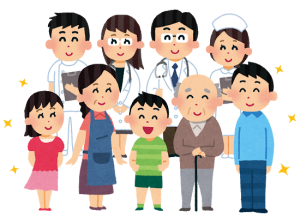Mental health care for COVID-19
Department of Disaster and Community Psychiatry, University of Tsukuba, Medical Sciences
University of Tsukuba Hospital Ibaraki Research Center for Disaster and Community Psychiatry
At present, various measures are being taken globally against COVID-19 but there are still no sufficient treatments or testing available. An outbreak of infection is considered a disaster by international standards and may cause psychological problems similar to terrorism, war, and natural disasters. Therefore, as a medical team involved in disaster psychiatry, we have compiled this document to inform the public, media, and advocates about mental health care related to COVID-19. We hope it will help you in your disaster preparedness against infectious diseases.
-----------------------------------------------------
1. Infectious epidemics can cause a variety of mental health problems

The spread of infection can cause anxiety, fear, strong anger, excitement, insomnia, and many other feelings in people’s minds. In addition, there are now infection control measures such as isolation and home confinement. This is unavoidable in order to prevent the spread of infection but, when freedom of action is restricted, a specific psychological state called “detention reaction” may occur in which people lose their feelings of joy, anger, sadness, and sorrow and then start to feel strong anxiety, feel as if the situation around them is someone else’s business, and feel as if they are being bullied or marginalized. It can also cause a unique psychological state called the “detention response”. Also, when one person in a close relationship is quarantined due to infection, the remaining person may feel anxious and depressed about being separated from others.
These reactions are not unique and are natural psychological responses that can occur in anyone during this situation. Detention reactions, in particular, usually improve once the isolation is lifted. However, if this situation continues for a long time, it may cause mental and physical problems. In such cases, you should consult a psychiatrist or psychologist.
2. Live a life that keeps your mind and body healthy
In order to maintain our mental and physical health, we should maximize our ability to maintain our health (resilience) against this disaster by talking with those close to us, treating each other well, leading a regular life (including sufficient sleep and healthy meals), and maintaining the same rhythm of life as before. Especially now that people are refraining from going out and holding events, it is likely that the amount of physical activity will be reduced so try to get some moderate exercise. Also, enjoy activities that you can do at home (reading, watching movies, creative activities, games, etc.)!
・Ministry of Health, Labour and Welfare: Protecting Mental Health
https://www.mhlw.go.jp/stf/houdou/2r98520000015or4.html
3. Take in the right information in the right amounts
On the Internet and other media, various false rumors and claims, such as “water at 26-27 degrees Celsius kills viruses”, are circulated. When the situation is ambiguous and people’s anxiety is high, it is easy for inaccurate information to spread to the public.
In order not to be swayed by uncertain information, it is important to obtain correct information with clear sources. As a countermeasure, it is necessary to confirm the source of information and look for appropriate consultation services introduced by the national government, local governments, research institutions, and national newspapers. If a variety of information increases your anxiety, be careful not to take in too much information by consciously reducing the amount of time you spend watching TV or browsing the Internet.

Examples of websites that are considered to be highly reliable:
・Ministry of Health, Labour and Welfare: New Coronavirus Infection
https://www.mhlw.go.jp/stf/seisakunitsuite/bunya/0000164708_00001.html
・ NHK NEWS WEB:
https://www3.nhk.or.jp/news/
・WHO:Basic protective measures against the new coronavirus(English)
https://www.who.int/emergencies/diseases/novel-coronavirus-2019/advice-for-public
4. Watch out for panic, discrimination, bullying, and rumors
The collective psychological anxiety that infectious disease-related disasters cause in people can lead to a variety of social problems. For example, inaccurate rumors and false accusations, such as “everyone in a certain area is infected” or “this problem may be caused by a certain person”, may cause suspicion and prejudice which may lead to bullying, discrimination, and rumors against a certain individual or group.
We ask the media and other information providers to be aware of the above risks and to be cautious when reporting sensational stories about COVID-19 or about specific people. We also ask that you give due consideration to personal information. Since the quality of information is very important in times of disaster, please make sure that the source of the information is clear and the content is accurate.
5. To care providers – please don’t be overwhelmed
We would like to express our sincere gratitude to the many care providers, including medical professionals involved in the COVID-19 initiative, for their daily activities. Thanks to your efforts, many people have been saved.
We know that some of you are working under the heavy anxiety of risk of infection to yourself, your loved ones, or your colleagues. Please take frequent rest and do not overexert yourself in your work.

Even if you are restricted in your activities, keep in touch with your friends who can share your hardships with you and be considerate of each other so that you do not fall into isolation. If you feel mentally exhausted, talk to your supervisor or someone you trust.
We would like to ask the heads of the organizations to which care providers belong to pay close attention to the content and risks of their support activities and to consider measures to support and protect them as an organization so that these valuable employees and their families will not be subjected to slander and bullying in the community where they live. Thank you very much.
 The spread of infection can cause anxiety, fear, strong anger, excitement, insomnia, and many other feelings in people’s minds. In addition, there are now infection control measures such as isolation and home confinement. This is unavoidable in order to prevent the spread of infection but, when freedom of action is restricted, a specific psychological state called “detention reaction” may occur in which people lose their feelings of joy, anger, sadness, and sorrow and then start to feel strong anxiety, feel as if the situation around them is someone else’s business, and feel as if they are being bullied or marginalized. It can also cause a unique psychological state called the “detention response”. Also, when one person in a close relationship is quarantined due to infection, the remaining person may feel anxious and depressed about being separated from others.
These reactions are not unique and are natural psychological responses that can occur in anyone during this situation. Detention reactions, in particular, usually improve once the isolation is lifted. However, if this situation continues for a long time, it may cause mental and physical problems. In such cases, you should consult a psychiatrist or psychologist.
The spread of infection can cause anxiety, fear, strong anger, excitement, insomnia, and many other feelings in people’s minds. In addition, there are now infection control measures such as isolation and home confinement. This is unavoidable in order to prevent the spread of infection but, when freedom of action is restricted, a specific psychological state called “detention reaction” may occur in which people lose their feelings of joy, anger, sadness, and sorrow and then start to feel strong anxiety, feel as if the situation around them is someone else’s business, and feel as if they are being bullied or marginalized. It can also cause a unique psychological state called the “detention response”. Also, when one person in a close relationship is quarantined due to infection, the remaining person may feel anxious and depressed about being separated from others.
These reactions are not unique and are natural psychological responses that can occur in anyone during this situation. Detention reactions, in particular, usually improve once the isolation is lifted. However, if this situation continues for a long time, it may cause mental and physical problems. In such cases, you should consult a psychiatrist or psychologist.
 Examples of websites that are considered to be highly reliable:
・Ministry of Health, Labour and Welfare: New Coronavirus Infection
https://www.mhlw.go.jp/stf/seisakunitsuite/bunya/0000164708_00001.html
・ NHK NEWS WEB:
https://www3.nhk.or.jp/news/
・WHO:Basic protective measures against the new coronavirus(English)
https://www.who.int/emergencies/diseases/novel-coronavirus-2019/advice-for-public
Examples of websites that are considered to be highly reliable:
・Ministry of Health, Labour and Welfare: New Coronavirus Infection
https://www.mhlw.go.jp/stf/seisakunitsuite/bunya/0000164708_00001.html
・ NHK NEWS WEB:
https://www3.nhk.or.jp/news/
・WHO:Basic protective measures against the new coronavirus(English)
https://www.who.int/emergencies/diseases/novel-coronavirus-2019/advice-for-public
 Even if you are restricted in your activities, keep in touch with your friends who can share your hardships with you and be considerate of each other so that you do not fall into isolation. If you feel mentally exhausted, talk to your supervisor or someone you trust.
We would like to ask the heads of the organizations to which care providers belong to pay close attention to the content and risks of their support activities and to consider measures to support and protect them as an organization so that these valuable employees and their families will not be subjected to slander and bullying in the community where they live. Thank you very much.
Even if you are restricted in your activities, keep in touch with your friends who can share your hardships with you and be considerate of each other so that you do not fall into isolation. If you feel mentally exhausted, talk to your supervisor or someone you trust.
We would like to ask the heads of the organizations to which care providers belong to pay close attention to the content and risks of their support activities and to consider measures to support and protect them as an organization so that these valuable employees and their families will not be subjected to slander and bullying in the community where they live. Thank you very much.